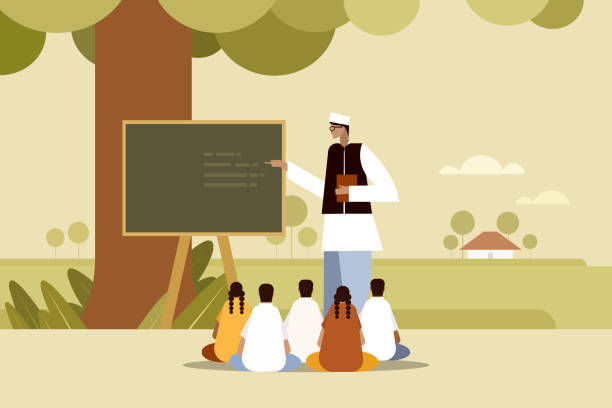BLOG
8 Unmatched Advantages of the Gurukul System of Education

Gurukul means an ancient Indian system of learning, where education is derived from a guru’s guidance. This occurs in a nature-friendly environment. The educational system focuses on character-building, practical skills, and moral values, along with imparting academic knowledge. This helps students develop discipline and respect for the teacher. It creates a respectful bond between teacher and student.
This blog highlights the advantages of the gurukul system of education. Later on, let us compare the gurukul and modern educational systems.
Top 8 Advantages of the Gurukul System
Focus on Holistic Development
The Gurukul system encourages holistic development as learning goes hand in hand with physical, emotional, and spiritual growth. Students are involved in activities like yoga and meditation and practice practical skills. This fosters discipline and self-reliance along with building a well-balanced personality. It grooms students for the realities of life.
Strong Teacher-Student Bond
The Gurukul system emphasizes a strong bond between teacher and student through daily, close contact and shared residence. A teacher is like a mentor in guiding students in academic, moral and emotional fields. It instills trust and respect and develops an atmosphere that encourages holistic growth and character building.
Emphasis on Practical Knowledge and Life Skills
The Gurukul system focuses on imparting practical knowledge and skills that prepare the student for real-life situations. The activities of farming, cooking, etc., complement academic learning. This makes students independent and resourceful. The hands-on approach ensures that students acquire essential skills in everyday life and develop a capable personality.
Development of Discipline and Self-Control
The Gurukul system of education promotes discipline and self-control through organized routines and moral teachings. It follows strict daily schedules with a proper balance between academics, physical activities, and spiritual practices. This atmosphere helps them develop self-discipline, manage time, and emotionally regulate their lives to lead well-balanced, responsible, and focused lives.
Promotes Community Living and Cooperation
The Gurukul system encourages community living. It teaches the students to live, learn, and work together in harmony. Shared responsibilities like cooking and cleaning promote unity, mutual respect, and cooperation, which are the basis to live in any community.
Encourages Respect for Nature and Simplicity
The Gurukul system supports respect for nature and the simplistic style of living by keeping them deeply engulfed in natural surroundings. And this style of living becomes one with nature through farming activities and environmental care. Thereby, this way of life encourages humility, gratefulness, and a more harmonious relationship with nature.
Personalized Learning and Attention
The Gurukul system provides individualized learning with small groups and close contact between teachers and students. Lessons are adjusted according to the ability and needs of each student so that proper understanding and growth take place. This allows for academic excellence, self-confidence, and a positive environment for overall development.
Values-Based Education
The Gurukul system emphasizes values-based education, integrating moral teachings with academics. Students learn ethics, respect, humility, and responsibility through daily interactions and practical examples. This approach nurtures character development, instilling principles that guide them in making ethical decisions and contributing positively to society.
Comparison: Gurukul System vs. Modern Education
Aspect | Gurukul System | Modern Education |
Learning environment |
|
|
Emphasis | Holistic development of a child | Development of academic and professional skills |
Teacher-student relationship | Informal and very strong | Formal and professional |
Teaching methodology | Hands-on experience | Mostly theoretical and exam-centric |
Curriculum | Tailored to each student | Standardized and uniform for all |
Skills taught | Life skills | Technical skills |
Community aspect | A sense of belongingness | Individualism |
Assessment | Observation | Exams, assignments |
Is the Gurukul System Relevant Today?
Today, the Gurukul system remains inspirational for holistic development, value-based education, and practical skill development.
Although modern education stresses more on present technological and professional needs, Gurukul principles related to mindfulness, discipline, and community living are relevant till today.
They help maintain an equation between rigorous academics and the development of well-rounded personalities apt for current challenges.
Conclusion
The Gurukul system aims at holistic development, inculcating discipline, life skills, and values through personalized learning and bonding between the teacher and the student. Though modern education is very advanced academically and technologically, Gurukul principles can blend well with the modern system and provide a holistic approach towards making individuals academically sound, socially fit, and ethically rich in today’s world.
The advantages of the Gurukul system showcase how traditional education fosters discipline, character, and spiritual growth. With modern relevance, it aligns well with 10 essential modern values for students and the four pillars of holistic education. This approach is also reflected in schools that prioritize moral values and academic excellence. Parents looking for such balanced education often explore gurukul schools in bangalore. New Horizon Gurukul stands among the top choices for cbse schools in bangalore.
Check: Pre-primary Schools in Bangalore
Frequently Asked Questions (FAQs)
- What is the Gurukul System of Education?
The Gurukul system is one of the ancient Indian methods of education, where students stay with their teacher or guru in a natural setting. Here, learning imparts academics, life skills, discipline, and moral values. - How does the Gurukul System Support Holistic Development?
Gurukul supports holistic development by integrating practical skills with academics, physical activities and moral teachings. Discipline, emotional intelligence, and spiritual growth are fostered in an individual who can face challenges in life. - What Life Skills do Students Learn in the Gurukul System?
Students in the Gurukul system learn life skills such as self-reliance, time management, teamwork, problem-solving, and sustainable living. Activities like farming, cooking, and meditation foster independence, responsibility, and adaptability. - How does the Teacher-Student Relationship Differ in the Gurukul System?
In the Gurukul system, students are raised under the close guidance of gurus. They share an informal relationship beyond academics. The shishyas developed a deep respect for their gurus along with inculcating values like trust, spirituality and discipline. - Can the Gurukul System be Integrated into Modern Education?
Yes, some crucial elements of the Gurukul system can be integrated into modern education. Emphasis on practicality, respect for gurus, sustainability, holistic development, discipline, morality, etc., should be incorporated in schools.




